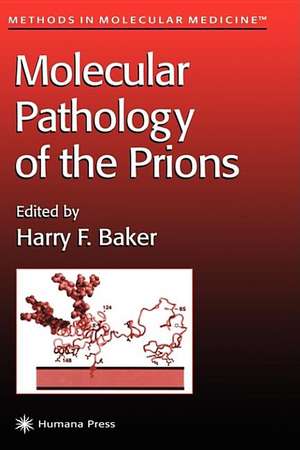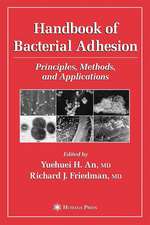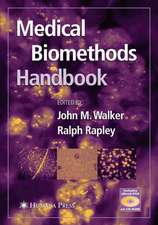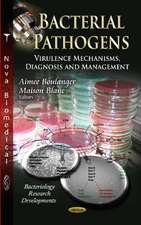Molecular Pathology of the Prions: Methods in Molecular Medicine, cartea 59
Editat de Harry F. Bakeren Limba Engleză Hardback – 13 iul 2001
| Toate formatele și edițiile | Preț | Express |
|---|---|---|
| Paperback (1) | 1030.27 lei 43-57 zile | |
| Humana Press Inc. – 9 noi 2010 | 1030.27 lei 43-57 zile | |
| Hardback (1) | 668.64 lei 38-44 zile | |
| Humana Press Inc. – 13 iul 2001 | 668.64 lei 38-44 zile |
Din seria Methods in Molecular Medicine
- 5%
 Preț: 1278.74 lei
Preț: 1278.74 lei - 15%
 Preț: 655.78 lei
Preț: 655.78 lei - 5%
 Preț: 1106.50 lei
Preț: 1106.50 lei - 5%
 Preț: 727.44 lei
Preț: 727.44 lei - 5%
 Preț: 1108.72 lei
Preț: 1108.72 lei - 15%
 Preț: 650.55 lei
Preț: 650.55 lei - 5%
 Preț: 735.66 lei
Preț: 735.66 lei - 18%
 Preț: 947.35 lei
Preț: 947.35 lei - 18%
 Preț: 948.92 lei
Preț: 948.92 lei - 5%
 Preț: 1114.54 lei
Preț: 1114.54 lei - 5%
 Preț: 1114.91 lei
Preț: 1114.91 lei - 15%
 Preț: 658.55 lei
Preț: 658.55 lei - 5%
 Preț: 734.01 lei
Preț: 734.01 lei - 5%
 Preț: 1111.61 lei
Preț: 1111.61 lei - 5%
 Preț: 1104.32 lei
Preț: 1104.32 lei - 5%
 Preț: 723.21 lei
Preț: 723.21 lei - 5%
 Preț: 1106.13 lei
Preț: 1106.13 lei - 5%
 Preț: 723.05 lei
Preț: 723.05 lei - 5%
 Preț: 1108.35 lei
Preț: 1108.35 lei - 5%
 Preț: 723.42 lei
Preț: 723.42 lei - 5%
 Preț: 1115.65 lei
Preț: 1115.65 lei - 5%
 Preț: 786.86 lei
Preț: 786.86 lei - 5%
 Preț: 1133.01 lei
Preț: 1133.01 lei - 5%
 Preț: 1114.71 lei
Preț: 1114.71 lei
Preț: 668.64 lei
Preț vechi: 703.84 lei
-5% Nou
Puncte Express: 1003
Preț estimativ în valută:
127.95€ • 133.92$ • 106.49£
127.95€ • 133.92$ • 106.49£
Carte tipărită la comandă
Livrare economică 26 martie-01 aprilie
Preluare comenzi: 021 569.72.76
Specificații
ISBN-13: 9780896039247
ISBN-10: 0896039242
Pagini: 279
Ilustrații: XII, 279 p.
Dimensiuni: 155 x 235 x 22 mm
Greutate: 0.68 kg
Ediția:2001
Editura: Humana Press Inc.
Colecția Humana
Seria Methods in Molecular Medicine
Locul publicării:Totowa, NJ, United States
ISBN-10: 0896039242
Pagini: 279
Ilustrații: XII, 279 p.
Dimensiuni: 155 x 235 x 22 mm
Greutate: 0.68 kg
Ediția:2001
Editura: Humana Press Inc.
Colecția Humana
Seria Methods in Molecular Medicine
Locul publicării:Totowa, NJ, United States
Public țintă
Professional/practitionerCuprins
What Would Thomas Henry Huxley Have Made of Prion Diseases?.- Prion Protein as Copper-Binding Protein at the Synapse.- A Function for the Prion Protein?.- Prion Protein Peptide.- Characterization of Bovine Spongiform Encephalopathy and Scrapie Strains/Isolates by Immunochemical Analysis of PrPSc.- Differential Targeting of Neurons by Prion Strains.- Transgenic Studies of Prion Diseases.- Prions: From Neurografts to Neuroinvasion.- Cellular and Transgenic Models of Familial Prion Diseases.- Central Nervous System Inflammation and Prion Disease Pathogenesis.- The Electroneuropathology of Prion Disease.- Transmissible Spongiform Encephalopathy Neurobiology and Ultrastructure Suggests Extracellular PrPSc Conversion Consistent with Classical Amyloidosis.- Conformation as Therapeutic Target in the Prionoses and Other Neurodegenerative Conditions.- Prions of Yeast From Cytoplasmic Genes to Heritable Amyloidosis.
Textul de pe ultima copertă
It is now widely agreed that the prion protein plays a key role in the molecular pathogenesis of prion diseases-diseases that involve the misfolding of proteins-in both humans and animals. In Molecular Pathology of the Prions, noted prion researcher Harry Baker has asked internationally recognized investigators to review the latest developments in, and novel approaches to, understanding the prion protein and prion diseases at the molecular level. Utilizing a variety of cutting-edge techniques, these distinguished scientists seek to define the normal function of a prion protein, to detect and measure the early immune response to prion disease, and to discover possible therapeutic targets. They also use transgenic mice and new electrophysiological investigations to elucidate the pathogenetic mechanisms involved in prion diseases. Other topics addressed include the neuronal death that occurs in prion disease, the different strains of prion disease agents, and the accumulation of protein deposits within brain parenchyma.
State-of-the-art and richly insightful, Molecular Pathology of the Prions captures for basic and clinical neuropathologists the latest developments and approaches to understanding the pathogenesis of prion diseases, including research techniques now likely to enjoy broader application for the more common proteinopathies, such as Alzheimer's and Parkinson's diseases.
State-of-the-art and richly insightful, Molecular Pathology of the Prions captures for basic and clinical neuropathologists the latest developments and approaches to understanding the pathogenesis of prion diseases, including research techniques now likely to enjoy broader application for the more common proteinopathies, such as Alzheimer's and Parkinson's diseases.
Caracteristici
Includes supplementary material: sn.pub/extras
















